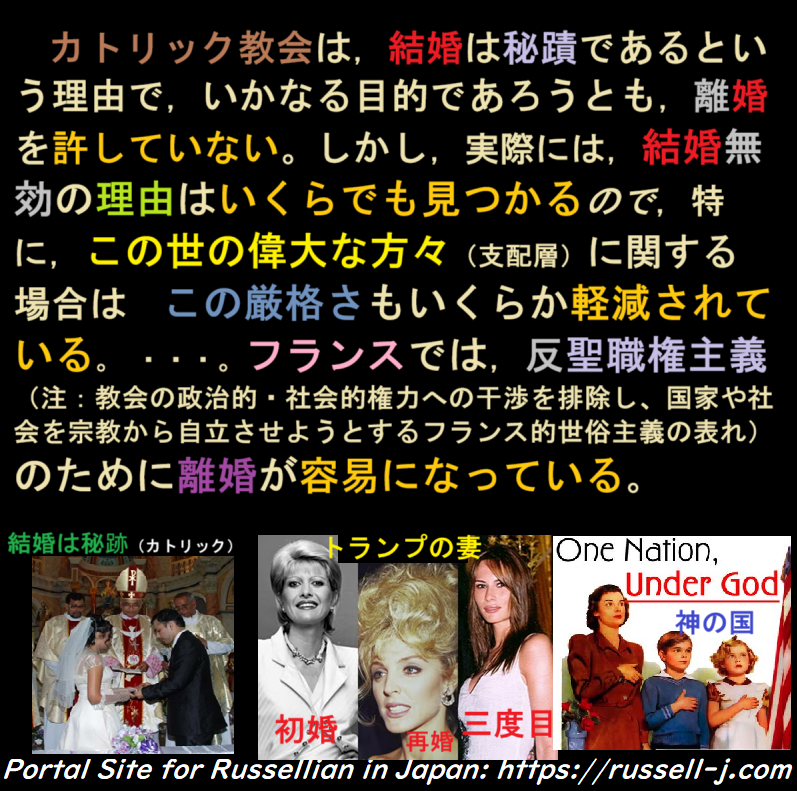
 ラッセル関係電子書籍一覧 |
カトリック教会は,結婚は秘蹟であるという理由で,いかなる目的であろうとも,離婚を許していない。しかし,実際には,結婚無効の理由(nullity)はいくらでも見つかるので 特に,この世の偉大な方々(the great ones of the earth 支配層)に関する場合は この厳格さもいくらか軽減されている。 ・・・。 フランスでは,反聖職権主義(注:教会の政治的・社会的権力への干渉を排除し、国家や社会を宗教から自立させようとするフランス的世俗主義の表れ)のために離婚が容易になっている。
The Catholic Church, on the ground that marriage is a sacrament, does not allow divorce for any purpose whatsoever, but in practice this severity is somewhat mitigated - especially where the great ones of the earth are concerned - by the fact that there are many grounds for nullity. ... In France, anti-clericalism produces easy divorce.
Source: Bertrand Russell: Marriage and Morals, 1929
More info.:https://russell-j.com/beginner/MM16-010.HTM
<寸言>
国によって多少違いがあるでしょうが、一般的に、カトリック圏では離婚には厳しいが不倫に対しては比較的寛容な傾向があると言われています。逆に、プロテスタント圏では、不倫などの性的逸脱には厳しい姿勢を示す一方で、離婚や再婚は比較的容認されています。例えば、カトリックの伝統が強いイタリアでは、離婚が合法化されたのは遅く、1970年代です。一方プロテスタントの多いアメリカでは離婚率が高く、何度も結婚をする人もけっこういて、政治家などの不倫スキャンダルがしばしば強く非難されます。
因みに、トランプ大統領は、長老派で堅信礼を受けたプロテスタント(注:石破総理も同じ)でありながら、大統領選挙中は「無教派のキリスト教徒(non-denominational Christian)」を名乗って、福音派の支持を取り付けました。しかし、彼の私生活は伝統的な福音派の倫理観とは一致しない面もあります。たとえば、彼は3度結婚しており、2度離婚しています。また、キリスト教、特にキリスト教福音派では、個人の謙虚さや自己抑制が必要とされていますが、トランプの自己中心的な言動は福音派の価値観と対立しているように思われます。それなのに、なぜ福音派の多くの人々はトランプを熱心に支持しているのでしょうか?
宗教は本来、自己顕示や傲慢さを戒めますが、トランプは「宗教に従う信者」というよりも、「自分こそが神のような存在である」という自己イメージの延長として宗教を利用しているように見えます。それとも、自分の言動に疑いをもたない狂信的信者でしょうか?
While there may be some variation from country to country, it is generally said that in Catholic societies, divorce is viewed quite strictly, whereas extramarital affairs are treated with relative leniency. Conversely, in Protestant societies, there tends to be a stricter stance on sexual misconduct such as infidelity, but a more accepting attitude toward divorce and remarriage. For example, in Italy, where Catholic tradition remains strong, divorce was only legalized in the 1970s. In contrast, in the United States, which has a large Protestant population, the divorce rate is high, multiple marriages are not uncommon, and politicians are often heavily criticized when involved in extramarital scandals.
Incidentally, President Trump, although a Protestant who was confirmed in the Presbyterian Church (Prime Minister Ishiba of Japan, by the way, shares the same denomination), identified himself during the presidential campaign as a “non-denominational Christian” in order to secure support from evangelical voters. However, his personal life does not always align with the traditional ethical standards of evangelical Christianity. For example, he has been married three times and divorced twice. Furthermore, Christianity, especially in its evangelical form, emphasizes personal humility and self-restraint, but Trump’s egocentric behavior often seems at odds with these values. So why do so many evangelicals support him so fervently?
Religion, by its very nature, is supposed to caution against vanity and arrogance. Yet Trump seems to use religion not as a believer who follows a faith, but as an extension of his self-image, as if he himself were a kind of god. Or is he, perhaps, a fanatic who believes in his own infallibility?